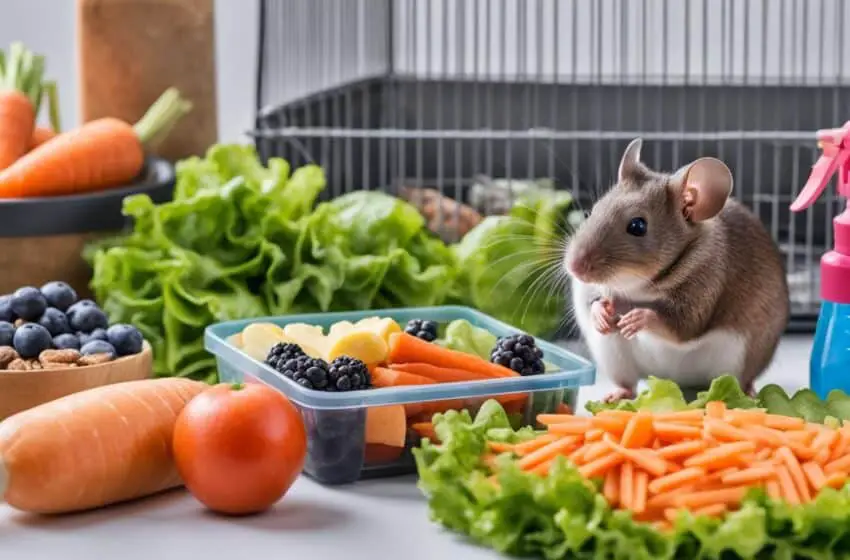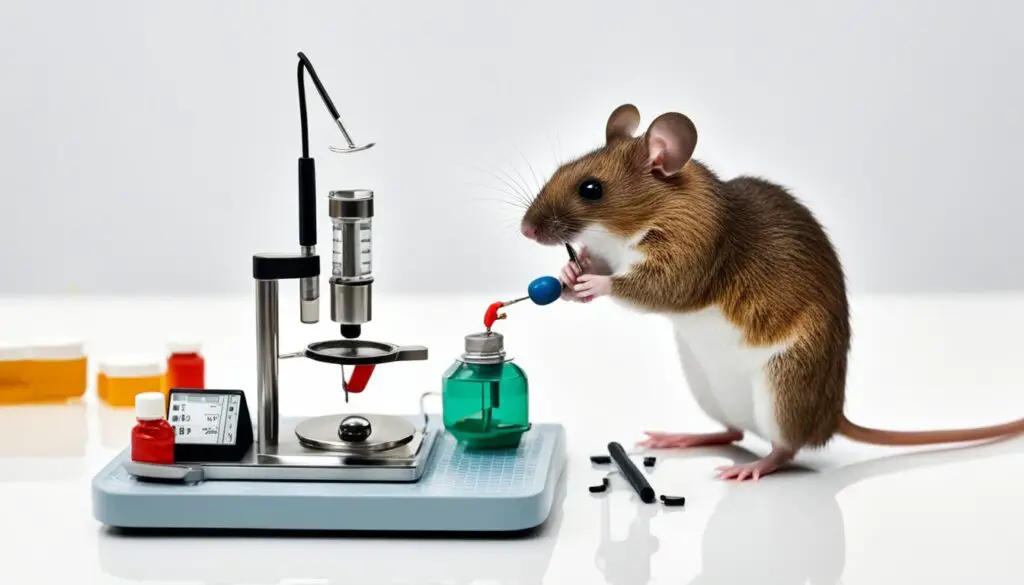Preventive Strategies to Keep Your Pet Mouse Healthy

Taking proactive measures to prevent illness in your pet mouse is crucial for their overall well-being. By implementing the right strategies, you can significantly reduce the risk of health issues and ensure that your furry friend stays healthy and happy. In this article, I will share key tips for preventing illness in pet mice, focusing on their health, nutrition, and environment.
Key Takeaways:
- Creating a suitable habitat for your pet mouse is essential to promote good health.
- Provide a spacious cage with proper ventilation and temperature.
- Use safe and absorbent bedding materials for cleanliness.
- Offer a balanced diet with high-quality mouse food and fresh fruits/vegetables as treats.
- Schedule regular veterinary check-ups to detect health issues early on.
Creating a Healthy Environment for Your Pet Mouse
Creating a suitable habitat is vital to ensure the health and well-being of your pet mouse. A healthy environment promotes their overall well-being and reduces the risk of illness. Here are some key tips for designing a healthy pet mouse habitat:
- Spacious Cage: Provide a cage with ample space for your mouse to exercise and explore. This allows them to engage in natural behaviors and promotes physical activity.
- Proper Ventilation: Ensure the cage has proper ventilation to maintain fresh air circulation. Good ventilation helps prevent respiratory problems and keeps the environment clean.
- Optimal Temperature and Humidity: Maintain a comfortable temperature and humidity level in the mouse habitat. Ideal temperatures for pet mice range from 65 to 75°F (18 to 24°C), and humidity should be kept between 40% and 60%.
- Safe Bedding: Choose bedding materials that are safe, absorbent, and comfortable for your pet mouse. Avoid using cedar or pine shavings, as they can be harmful to their respiratory system. Opt for alternatives like aspen or paper bedding.
- Regular Cleaning: Clean the cage regularly to prevent the buildup of bacteria and odors. Remove any soiled bedding and spot-clean the cage as needed. A clean environment minimizes the risk of infections and ensures the well-being of your pet mouse.
- Access to Fresh Water: Provide your mouse with a fresh supply of water at all times. Use a water bottle with a sipper tube to prevent contamination and ensure easy access for your pet.
- Balanced Diet: Offer a balanced and nutritious diet to support your pet mouse’s overall health. Consult a veterinarian to determine the appropriate mouse food and the right amount to be served daily.
Creating a Stimulating Environment
Your pet mouse also needs mental stimulation and enrichment in their habitat. Provide interactive toys, hiding places, and tunnels to keep them mentally engaged and prevent boredom. Incorporate exercise wheels or climbing structures to encourage physical activity. Remember to rotate toys and rearrange the habitat periodically to maintain novelty and mental stimulation.
“Designing a healthy environment for your pet mouse ensures their well-being and reduces the risk of illness. By implementing these strategies, you can provide a safe and stimulating habitat where your pet can thrive.” – Dr. Lisa Richards, Veterinary Specialist
Creating a healthy environment for your pet mouse is essential for their overall health and happiness. The right combination of space, ventilation, cleanliness, and mental stimulation promotes a flourishing and thriving pet. Remember to consult with a veterinarian for specific recommendations tailored to your pet mouse’s unique needs. By prioritizing their environment, you are taking a significant step towards providing a long and healthy life for your beloved pet.
Maintaining a Nutritious Diet for Your Pet Mouse
A nutritious diet plays a vital role in preventing illness in pet mice. By providing your mouse with a healthy mouse diet rich in essential nutrients, you can help ensure their overall well-being. Here are some key aspects to consider:
High-Quality Mouse Food
Offer your pet mouse a high-quality mouse food that is specifically formulated to meet their nutritional needs. Look for a brand that contains a balanced combination of seeds, grains, and pellets. This will provide a variety of nutrients and textures to keep your mouse engaged and healthy.
Supplement with Fresh Fruits and Vegetables
In addition to mouse food, you can supplement your pet’s diet with fresh fruits and vegetables as occasional treats. These can provide additional vitamins and minerals that mice need for optimal health. However, it’s important to choose safe options and avoid foods that are toxic to mice, such as chocolate or onions.
Some safe fruits and vegetables for mice include:
- Apples (remove seeds)
- Bananas (in moderation)
- Carrots
- Cucumbers
- Peas
Monitor Food Intake
It’s essential to monitor your pet mouse’s food intake to prevent both overfeeding and underfeeding. Obesity is a common problem in pet mice, so be cautious about providing excessive amounts of high-calorie treats. On the other hand, insufficient food intake can lead to malnutrition. Keep an eye on your mouse’s weight and adjust the portion sizes accordingly.
Ensure Proper Hydration
Alongside a healthy diet, make sure your pet mouse has access to fresh, clean water at all times. Provide a water bottle or dish that is easily accessible within their cage. Regularly check the water supply to ensure it’s clean and replenish it as needed.
By following these guidelines for pet mouse nutrition and maintaining a balanced diet, you can help keep your furry friend healthy and thriving.

| Fruits | Vegetables |
|---|---|
| Apples (remove seeds) | Carrots |
| Bananas (in moderation) | Cucumbers |
| Peas |
Regular Veterinary Check-ups and Preventive Care
Regular veterinary check-ups are essential for the health and well-being of your pet mouse. By scheduling routine visits to a veterinarian who specializes in exotic pets, particularly mice, you can ensure that any underlying health issues are detected early on and that preventive measures are taken to prevent the development of serious illnesses.
During these check-ups, your veterinarian will monitor your pet mouse’s overall health, conduct thorough examinations, and check for any signs of illness. Vaccinations and preventive treatments, such as parasite control, will also be administered to keep your mouse protected.
Practicing good hygiene when handling your pet mouse is crucial to prevent the spread of infections and parasites. Wash your hands thoroughly before and after interacting with your mouse, and clean their cage regularly to minimize the risk of disease transmission.
“Regular veterinary check-ups and preventive care are essential to ensure the overall health and longevity of your pet mouse. By being proactive and seeking professional guidance, you can provide your furry friend with the best possible care.”
Remember, prevention is key when it comes to the well-being of your pet mouse. Regular veterinary check-ups, along with proper hygiene and a clean environment, are vital components of preventive care that can help keep your pet mouse healthy and happy.

| Benefits of Regular Veterinary Check-ups and Preventive Care |
|---|
| Early detection and treatment of health issues |
| Prevention of serious illnesses |
| Vaccinations and preventive treatments |
| Expert guidance on pet mouse care |
| Minimization of disease transmission through proper hygiene |
Conclusion
By implementing the preventive strategies discussed in this article, you can significantly reduce the risk of illness in your pet mouse and ensure their overall well-being. Providing a healthy environment, maintaining a nutritious diet, and seeking regular veterinary care are all key factors in keeping your pet mouse healthy.
Creating a suitable habitat for your pet mouse is crucial. Make sure they have a spacious cage with proper ventilation, temperature, and humidity levels. Regularly clean the cage and change the bedding to prevent bacterial growth and odors. Additionally, ensure your mouse has access to fresh water and a balanced diet that meets their nutritional needs.
Regular veterinary check-ups are essential for preventive care. Find a veterinarian who specializes in exotic pets, particularly mice, and schedule routine visits. This will allow for early detection of any health issues and provide necessary vaccinations.
Remember to closely observe your pet mouse’s behavior and seek professional help if you notice any signs of illness. By prioritizing their health and taking proactive measures, you can enjoy many happy and healthy years with your beloved pet mouse.
FAQ
How can I create a healthy environment for my pet mouse?
To create a healthy environment for your pet mouse, provide a spacious cage with proper ventilation, temperature, and humidity levels. Use safe and absorbent bedding materials and regularly clean the cage to prevent the buildup of bacteria and odors. Ensure your mouse has access to fresh water and a balanced diet.
What should I feed my pet mouse to maintain a nutritious diet?
To maintain a nutritious diet for your pet mouse, offer a high-quality mouse food that includes a combination of seeds, grains, and pellets. Supplement their diet with fresh fruits and vegetables as treats. Avoid giving them foods that are toxic to mice, such as chocolate or onions, and monitor their food intake to prevent obesity.
How often should I take my pet mouse for veterinary check-ups?
It is recommended to schedule routine veterinary check-ups for your pet mouse to detect any underlying health issues early on. Find a veterinarian who specializes in exotic pets, particularly mice. Regular visits will help monitor your pet mouse’s overall health, check for signs of illness, and receive necessary vaccinations.
How important is regular cage cleaning and good hygiene for my pet mouse?
Regular cage cleaning and good hygiene are essential for maintaining your pet mouse’s health. Clean the cage regularly to minimize the risk of infections and parasites. Additionally, practice good hygiene when handling your mouse to prevent the transfer of germs.
What are some signs of illness I should watch out for in my pet mouse?
Observing your pet mouse’s behavior closely is important in detecting signs of illness. Some common signs of illness in mice include changes in appetite, weight loss, lethargy, changes in fur or coat condition, breathing difficulties, and abnormal behavior. If you notice any of these signs, it is important to seek professional help from a veterinarian.



